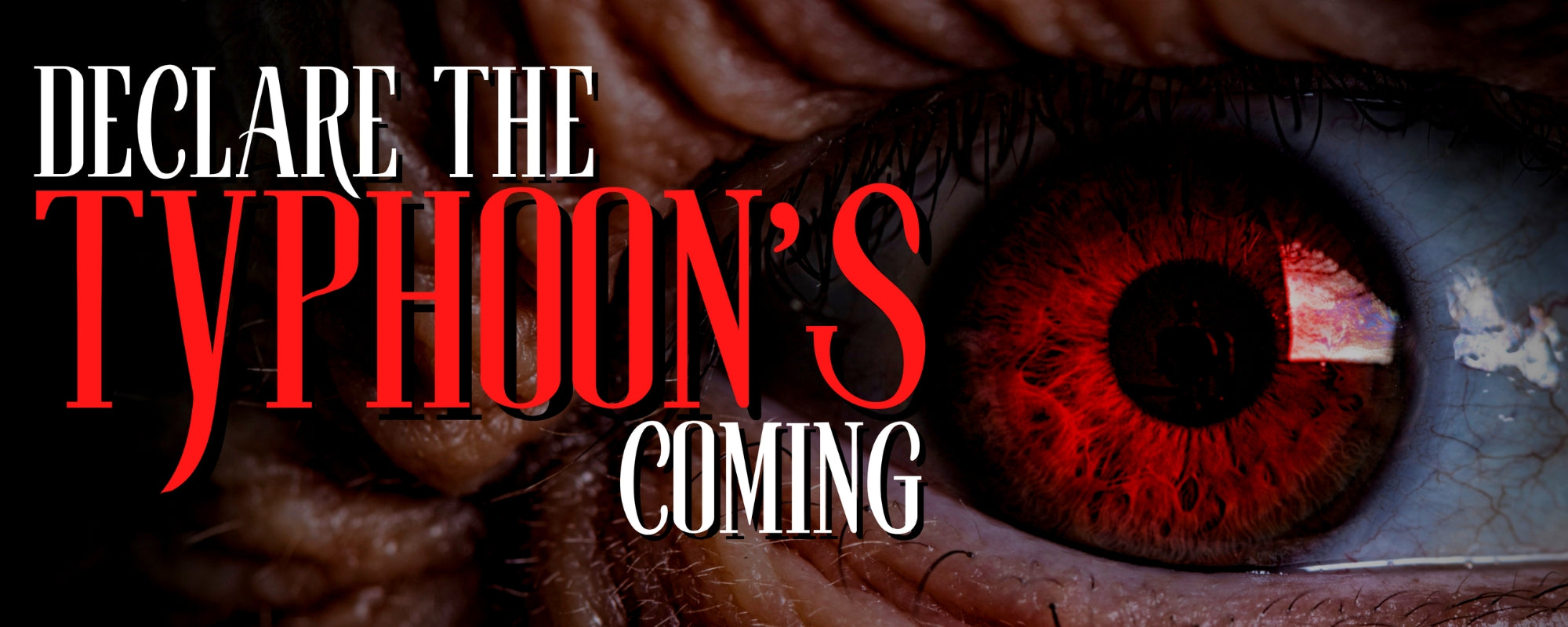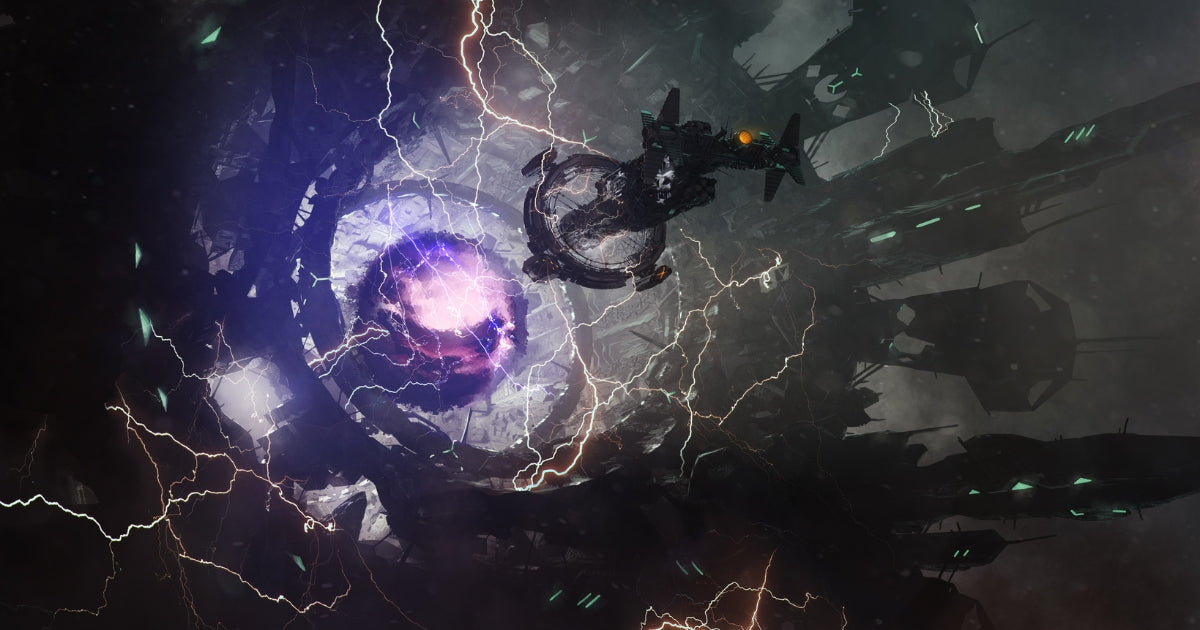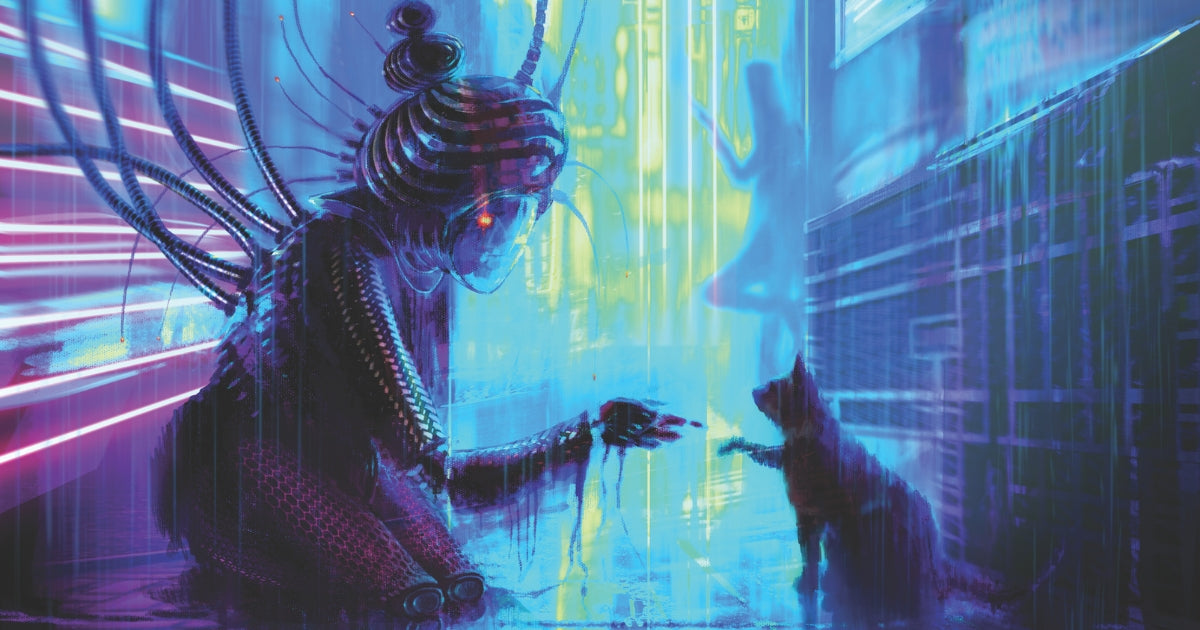

Declare the Typhoon's Coming
By Noah Codega
1.18
It would be the dead of winter now. I’ve been reflecting lately on the concept of seasons, something that happens in cycles for aeons as time turns in fractal spirals, twisting into eternity. Something that we only recognize because of the physical and biological conditions of Earth. How different might we have been if our planet of genesis had no tilt, if the proximity and angle of the sun had given Earth a climatic permanence undisturbed by the churning of years?
Nothing is permanent, though. The dying rock in our wake is some proof of that.
Life on the barque is an approximation of this idea, the non-season, as the cold and perpetual abyss tickles the hull. Yet we carry the memory of Earth-time with us. We understand years, weeks, months, and days as though these now-meaningless delineations were bred into us, as though they were instincts as strong as those to eat, to reproduce, to fight. The clocks onboard all march around tracks of twenty-four hours. It is still how we age ourselves, how we quantify the duration of this endless, endless fucking journey.
1.22
We came upon a stricken galleon some hours ago. It is at once cosmically coincidental and astoundingly mundane that we should encounter anything at all in a realm that is almost entirely nothingness. We have our route, of course—we may be spread out over hundreds of thousands of klicks, but the entire fleet, from the passenger barques and frigates to the smallest cargo scows, plies this same empty belt, this same Godforsaken tract of the depths of the universe.
If I sat in the Admiral’s chair, if my arse rested in pampered luxury on the bridge of his flagship, I would never bother with the stragglers. The protocol of the fleet, the code of idealistic conduct designed to safeguard our passage and ensure the largest possible numbers of us reach the end, festers in my mind like an ulcer. If some idiot of a captain
leads his ship to ruin, what business is it of mine to mop up his mistakes? Isn’t it better, after all, that he, incontrovertibly defective, should never reach our new home, never make up even the smallest part of the population?
Thoughts like these make me wonder sometimes whether I am ultimately fit for the command of a passenger barque. I think it unlikely.
We will dock soon. I’ve put Lieutenant Roscommon in command of the boarding party. No distress beacon from the galleon—no communication of any kind, in fact. On our approach, I pictured the many potential scenes of carnage inside. Raving lunatics anointing themselves in the blood of the captain. Heads rolling like marbles across the decks. Tableaux of death from the days when ships were things that sailed on oceans, that blasted each other apart with mutilating wads of iron. The most astounding products of human ingenuity and industry of their time, blindly serving Ares.
1.23
After we docked with the galleon, Lieutenant Roscommon boarded with some men of the crew. I shut off communication links on the bridge. Irresponsible, perhaps, but I wanted to have a drink in peace for once, without someone whining about this or that, begging me for orders, and a couple hours of inactivity to stare out at the depthless void from the bridge windows while they searched the ship was too providential an opportunity to ignore. Lieutenant Roscommon is, after all, quite as capable of handling any contingency as I am.
Our ships may achieve incredible velocities in the vacuum of space, but in the boundlessness of the great nothing, we are washed constantly in the illusion of stillness. This is why I drink. Not to forget, not to ease the pain, none of the idiotic cliches of the sots I’ve known, drinking themselves to blithering stupor. No. I drink to feel motion again, to feel the universe tipping and unsteady around me.
I began daydreaming. (Daydreaming? In the eternal night of space? See, Earth, your hold on me hasn’t loosened with the millions of klicks, this lingering entanglement of ours.) I pictured Lieutenant Roscommon and the men boarding a ship of screaming savages, driven over the brink of sensibility by the endlessness of this journey, and dispatching them sequentially with all due mercy. I saw the clean holes in their skulls, the swift vomit of blood from their temples, the streaks of sheening red flashing brilliantly across the walls. And then I pictured myself spewing my stomach onto the bridge deck, ranting and feverish, violent and inconsolable, and wondered what actions Lieutenant Roscommon might take against me. At what point would her sense of responsibility to our passengers eclipse her sense of duty to her captain?
I am fully aware that the deference Lieutenant Roscommon displays towards me is due wholly to her obsession with duty and the hierarchy of rank, and not because she thinks me at all competent as a leader. I would sooner have her draw her pistol on me, claw me to ribbons and declare herself captain by brute force—God knows she’s capable of it—than see her set her lips in that hard line and stare over my shoulder when she speaks to me, radiating only the faintest possible trace of insubordination. But no, she is delicate in her contumely. If only she were to leave behind the idea that rank means anything whatsoever in this inescapable emptiness.
When I flipped the communication links back on, there was an immediate babble of voices. I heard words but could not piece them together into anything meaningful in my state: crew, cargo, ejected, armed.
I made no reply. Sometime later (but I ask, not for the first time, not for the last: what does time really mean out here?), Lieutenant Roscommon entered the bridge, her uniform splashed dark with blood, her gray eyes wide and frantic. I was worried—no, terrified—until I realized by the way she carried herself, that confidence of movement she has always possessed, that the blood was not her own. She then tried speaking to me. I expect it was incredibly frustrating.
There was no crew on the stricken galleon, she told me. Not a single officer remained, not a single engineer or mechanic, not even the fucking cook. And there hadn’t been any passengers in the first place—it was a cargo ship. The cargo had revolted. The appropriate response for a captain, on learning that a fellow ship’s crew has been massacred and thrown to tumble eternally in the black desert, is, I’m quite sure, not to laugh. Certainly not to laugh so hard that he’s gasping for air and the tears stream from his eyes. But the idea that, without even trying, the entire crew of the galleon had managed to die struck me as incomparably funny.
I don’t remember Lieutenant Roscommon’s response. In fact, I remember nothing whatsoever until I woke up an hour or so ago on the cot in my cabin. We’re still docked with the galleon. I expect that it’s time, once again, for me to make a fucking decision.
1.23
I gather there was some good action before my crew locked the ship down tight, bless their fighting souls. By the time they had herded the rabble back into the hold, the throat of my second lieutenant had been torn from his neck and a midshipman had his entire face shredded like tissue paper by a flechette load. Lieutenant Roscommon and I gave them proper burials in stitched sheets and sent them from the starboard airlock with a prayer. I’ve asked her once or twice how many of the mob she and the crew had to eliminate to get them behaving, but she won’t answer me in anything other than the broadest terms. She’s off duty now. I’ve considered keeping her off for an extra watch or two, but I know she would take it as an insult.
Lieutenant Roscommon’s adamant position is that the galleon’s cargo should stand trial when we reach our destination. My word may be law on board, but she argues that an incident which did not occur on my ship should properly be handled by higher, rather than horizontal, authorities. I would just as soon leave them to drift into oblivion—they did, after all, manage to kill the captain and navigation officers in the riot. They made their bed. But I have agreed, if only to keep alive Lieutenant Roscommon’s pretense of strict adherence to the law of the fleet. Let her have her idealism and fantasies—I know how she feels about the chattel, even chattel who murder men under her direct command, and of whose number (I am quite sure) she dispatched a few herself. I see it in her eyes, hear it in the strain of her voice.
Let her dream of their freedom. They will never have freedom from themselves. For now, we tow them along behind us from the docking port, change the guard every six hours. We keep them as alive as they can be.
1.24
I went to see the galleon’s cargo this morning. From the observation deck, I watched them huddling in squalor in the hold, which has been modified to be completely soundproof. I do not count myself as being particularly interested in the bestial tongues of the slums that must sound like the clacking of nutshells or the grunting of rutting hogs, but the absence of sound produces an effect of serenity which seems wholly incompatible with the situation. See them down there, the degraded sons and daughters of obliterated nations, who yet vow themselves to silence, to beatific muteness. Though the hold must be full of the moans of the injured, the cries of the children, the babble of the men, nothing of it transits the glass of the deck windows. Stripped of their voices, they seem weak.
And these are the laborers by whose arms our new worlds will be built?
I’ve ordered the guard to keep them on quarter rations for now—absolutely needless, of course, with an entire galleon worth of provisions at our sudden disposal.
1.31
I visited the galleon again today. I stared down from the observation deck at the cargo. I saw the man who must be their leader. Tall and strong. He looks as though he could break me across his knee, and I don’t doubt that he would if we found ourselves together.
I had my men throw their packs of rations down to them, full rations this time, while I watched. I wanted a fight. I wanted to see them tear each other to rags. I wanted their starving bones to shatter.
Instead, their leader gathered all the food to himself and had the children come forward, one by one, until he had made sure they were fed. Then came the women who were with child, then the old and frail. Only when every single one of them—eighty? A hundred?—was eating did he himself begin.
Several of the injured must have perished in the past few days. Near the bay doors there are several bodies covered with torn sheets. I can see nothing of them but vague human forms, white under the bleaching lights of the cargo bay.
2.8
God help me. I’ve begun to pity them.
Or do I hate them? In truth, I don’t believe I’ve ever felt the one without feeling the other, and perhaps I have no internal divide between the two. How could a collection of beings so pitiable engender anything but hatred?
I think of them groveling there in the hold while their slain companions rot in the corner and am filled with rage. It disgusts me utterly. I wonder to myself what might have happened if they had managed to fight off my men, if my crew and I were the ones defeated and imprisoned. How would Lieutenant Roscommon have handled my putrefying in the corner? What would her words of comfort be to the crew? How would she lead them? I know how they watch her, how they look to her, how they trust her. I know they would follow her through the maw of death.
God, what would I do if she were killed?
In that situation, I think it likely that the best possible thing I could do for my crew would be to die.
If Earth were anything but a memory to us, Lieutenant Roscommon would see the cargo loosed back to their slums, where they would—what, exactly? What could they possibly get up to that would be more valuable, for either themselves or society as a whole, than the work of building new worlds? Back in their sprawling megalopolises of hovels, they were lucky for every sunrise that didn’t light up their bloated bodies reeking in a ditch. She may disapprove of the institution to which they belong, but she can hardly argue that they were stolen from Eden.
Still, my new position as caretaker discomforts me, and I wonder where my duty lies. With the investors expecting a healthy return on these abducted slum-dwellers when we reach our journey’s end? With the galleon’s murdered crew? But most of all, I find myself wondering how it is even possible that I should be accountable to anyone out here.
3.1
There has been no need whatsoever for me to check on the galleon we’re towing. The men I’ve left as sentry are more than capable, and with a little bit of alertness and precaution, traits obviously foreign to their predecessors, they have no problem whatsoever ensuring that the cargo is kept in check. There have been no incidents, and there will not be any incidents so long as everyone keeps doing their bloody jobs.
But I find myself drawn to it. Nearly every day, something compels me to go through the hassle of arranging a complement for the bridge and scurrying all the way down to the aft orlop to make the transit. Something in me wants to stand on the observation deck for hours at a time, watching their leader. I leave Lieutenant Roscommon in charge when I go—in fact, I haven’t once allowed her back to the galleon since we found it.
I have not, of course, heard a single sound from them from behind the hold’s muting shield of glass. But I perversely wonder sometimes at the melodies of the songs I see them singing. I wonder what their old world sounded like, and how different from my old world it was. I wonder how our lives could have been so different on the same rock. How they can still be so different here in the same darkness.
The leader stares at me. As though he’s felt some change intangible to the rest of them, he looks up to the deck windows when I enter, and he meets my eyes. His face never changes. It is always the same expression. I first took it for sadness. Christ knows the poor bugger’s got enough to be sad about.
But several days ago, I realized, in the chance glare of the overhead lights that reflected my face onto the window as a superimposition on top of his, as our features lined up and I caught sight of myself in him, himself in me—I realized that he was looking at me with pity.
3.9
Dreamed of Lieutenant Roscommon last night. I saw her standing on a mound of rubble, wearing a long white coat, her face smeared with grime, hair matted with blood, pistol in her hand, firing again and again, blasts of flame bursting in the darkness that surrounded her completely, blazing in her eyes.
Considered telling her about it and have decided not to.
3.12
Thoughts of the galleon’s prisoners have been intrusive. I see their leader when I lay down to sleep. I see his pitying stare, the wretches gathered around him. I think of the battles waged to tear them from their slums. I think of the slaughtered crew of the galleon. I think of their lives on our new home. I go to watch them every day. I wonder what their leader thinks of me. I wonder whether he is a leader by some show of force, or by some born position of authority, or whether the people around him trust him to lead because he has shown that he can, because he wins their respect not by commanding it, but by earning it. I think of his hands bloody with the lives of my own crew. I wonder whether he has the first idea who I am, my position of power over him, or whether I am simply another outsider looking in, another tormenting face in a ring of barbarian captors.
3.17
I cannot stop thinking of their corpses in the corner, what it must be like to live side-by-side with death and the weakness of flesh. I saw Lieutenant Roscommon limp and bloody under the navigation table last night. Shook my head and she was gone.
3.28
I’m a prisoner as well. Just as much as they are. That’s where his pity comes from. I may have control over a ship, and I may not be bound for chains when this voyage is over, but considered from any external vantage point, we are both absolutely unable to leave.
Finally, though, finally—I feel movement. God. I haven’t had a drop in days, and I can feel the universe tilting on its axis.
3.29
Lieutenant Roscommon is unhappy with me.
I’m unhappy with me.
Who isn’t?
When I reached the galleon today, I ordered my men back to the barque and took up my spot at the observation deck. There he was, their captain. There was his look of pity as he, in the middle of his crowd, looked at me standing alone.
For the first time, I waved at him.
He waved back.
I wonder whether there was any sound down there when I hauled the levers to open the bay doors. Did the void whisper or scream as it seethed into the hold? As it tore at their lungs and eyes and boiled their blood in their veins? I watched the silence. I watched as they drifted from the hold into the eternal black sea. I watched them go free.
3.31
Passed by Lieutenant Roscommon’s cabin in the mizzen tower this afternoon while she was off duty. Had been drinking. Door was partly ajar and I stopped to listen. Crying. Unmistakable. Quiet, though, as if she didn’t want to hear herself, shuddering irregular breaths. Shouldn’t have, but opened the door and stepped in. Must have heard my footsteps. Brought her red face out of her pillow. Stood at attention and asked what my orders were. Wanted to comfort her somehow, knew it utterly impossible. Thin lips trembling. Saw the ragged shards of her soul through her eyes. Those gray eyes. God. I have destroyed her.
4.9
They may rock upon the empty waves forever. They won’t decay in the void. They, poor jetsam, might float incorruptible until the end of time.
And how will I be remembered—me, who has murdered a hold of saints?
5.7
If I had given her the chance to stop me, would she have?
If I had brought her with me to the galleon and told her that if she did not step in to save the lives of the slaves, I was going to throw them to their deaths, would she have fought me?
I don’t know. I don’t know. But I want the duty to die in her throat.
6.2
I looked in his eyes as I opened the bay doors. The last conscious thought that ran through his brain, before the void sucked it dry like a spider sucks a fly, was pity for me. He died thinking me pathetic. He died as I thought him strong.
6.14
I have done no one any good. Not the passengers, the crew, not myself. Nothing but evil arises from this teetering wreck of a man.
I keep the bridge to myself. What do I need other officers for? To assist me in traveling a straight fucking line for billions of miles?
I see the fury and hatred and despair burning behind Lieutenant Roscommon’s eyes, but she won’t say a word against me. I’m beginning to lose hope that she ever will.
I want to be in her place. No—I wish I had been in her place from the start. I wish I’d had someone to order me, to tell me what to do. Someone I could have been responsible to, no matter how miserable a shit they might have been. I wish I had some purpose other than to stagnate and go straight, to go forward, to just keep going going going going going going going going going going going
6.29
If the universe is boundless, then where am I?
If I am first at some point in the midst of infinity, and I am then at some other point in the midst of infinity, there is no more infinity behind me or in front of me than there was before. In relation to the infinite, I have not moved at all. Stars may approach. Stars may recede. But no matter how far I travel through it, my position in the void is immutable.
7.12
I never even see the passengers. They could be imaginary. Here I am, blasting away, transiting this endless fucking country of nothing, and every single cabin is empty. This might all be some great cosmic joke. Not even Sisyphean. The boulder won’t roll back down the mountain. Just keep pushing it across the universe. There are no obstacles at all.
7.12
They must be real. They must be. No sense otherwise.
7.12
No fucking sense in the universe, anyway. What’s one more absurdity?
7.12
Why do I bother writing in this fucking book?
9.12
Lieutenant K. W. R. Roscommon:
If you should chance upon this journal, in the unlikely situation that you find yourself in command of this ship, and flip its pages in an idle moment before destroying all trace of me, please accept my
I am sorry.
I am so, so sorry.
12.16
I have my solution.
It is incredibly simple. I should have thought of it ages ago.
I will create a binary situation, a scenario in which there are two possible outcomes.
I am going to arm myself and ask Lieutenant Roscommon to accompany me to the passenger decks. I am going to gather them all together. Then I am going to pick one at random—some pathetic senile, perhaps, or better, a wailing child—and force them to kneel. I will aim my pistol at their head, and I will scream at Lieutenant Roscommon that she will either kill me and assume command or she will watch as I blow apart the skulls of each and every one of the people who are meant to represent a great wave of settlers to humanity’s furthest reaches. As I destroy hope. I will make sure we are far enough apart that she will be unable to restrain me and that in the time before I begin killing the distance between us might only be crossed by her bullet. I will make sure that these two options are all that remains. She is a good shot. She has seen what I am capable of. She will hesitate but she will not fail.
I am going to stop writing now. I am going to set my plan into motion because for the first time in an extremely long time I feel a true storm of movement and am excited.
Copyright © 2022 Noah Codega
The Author

Noah Codega
Continue reading

Subscribe to our newsletter
Promotions, new products, and sales. Directly to your inbox.



